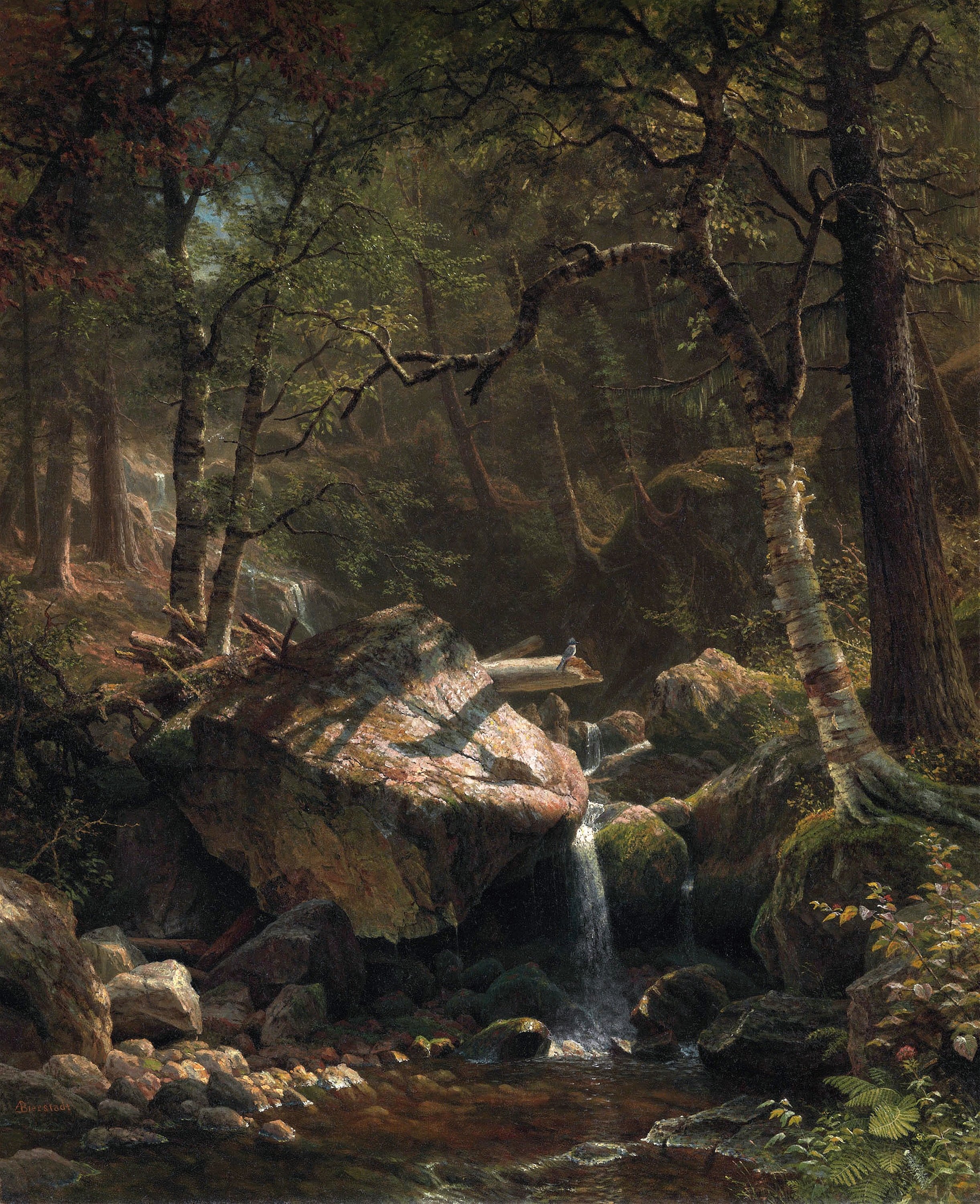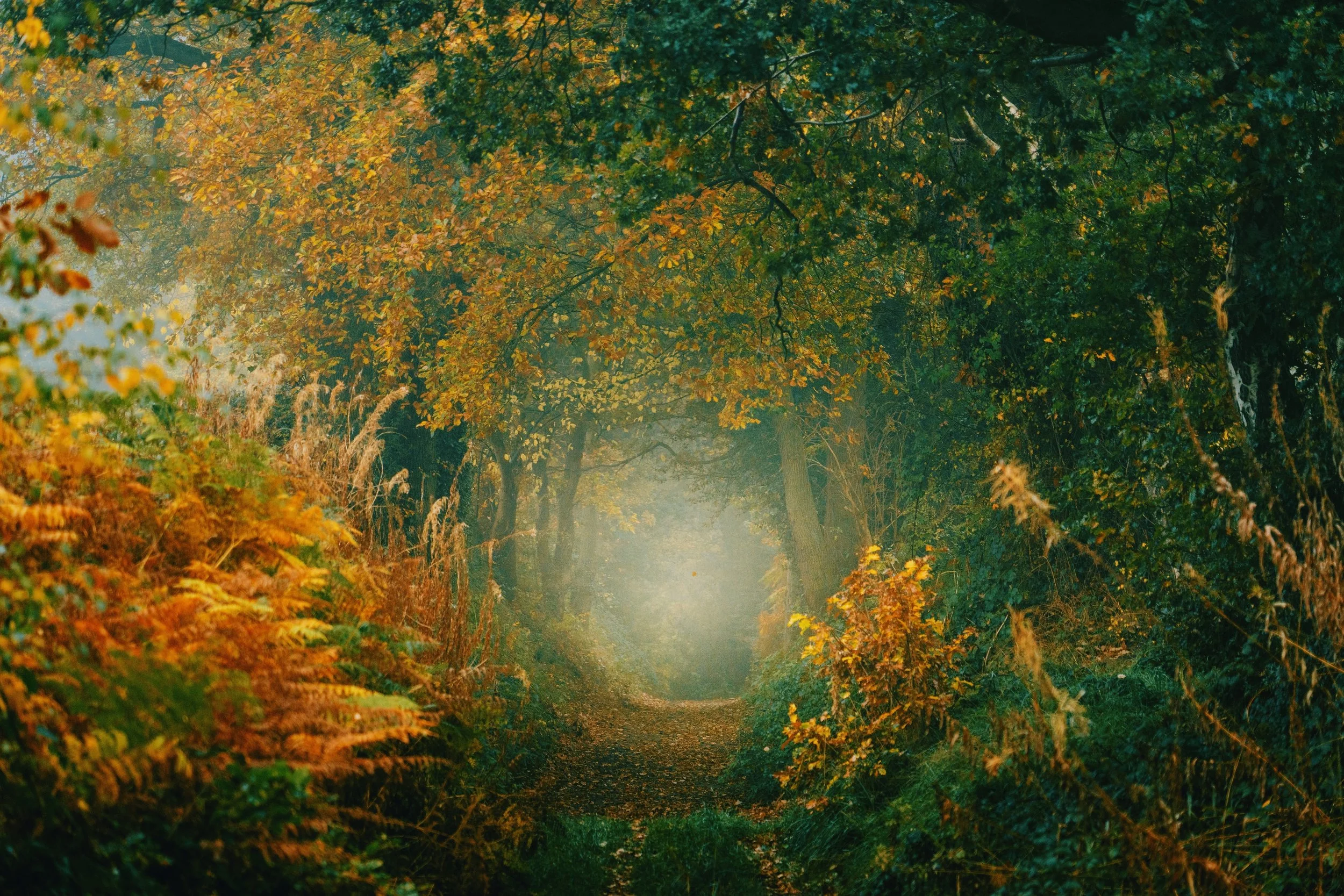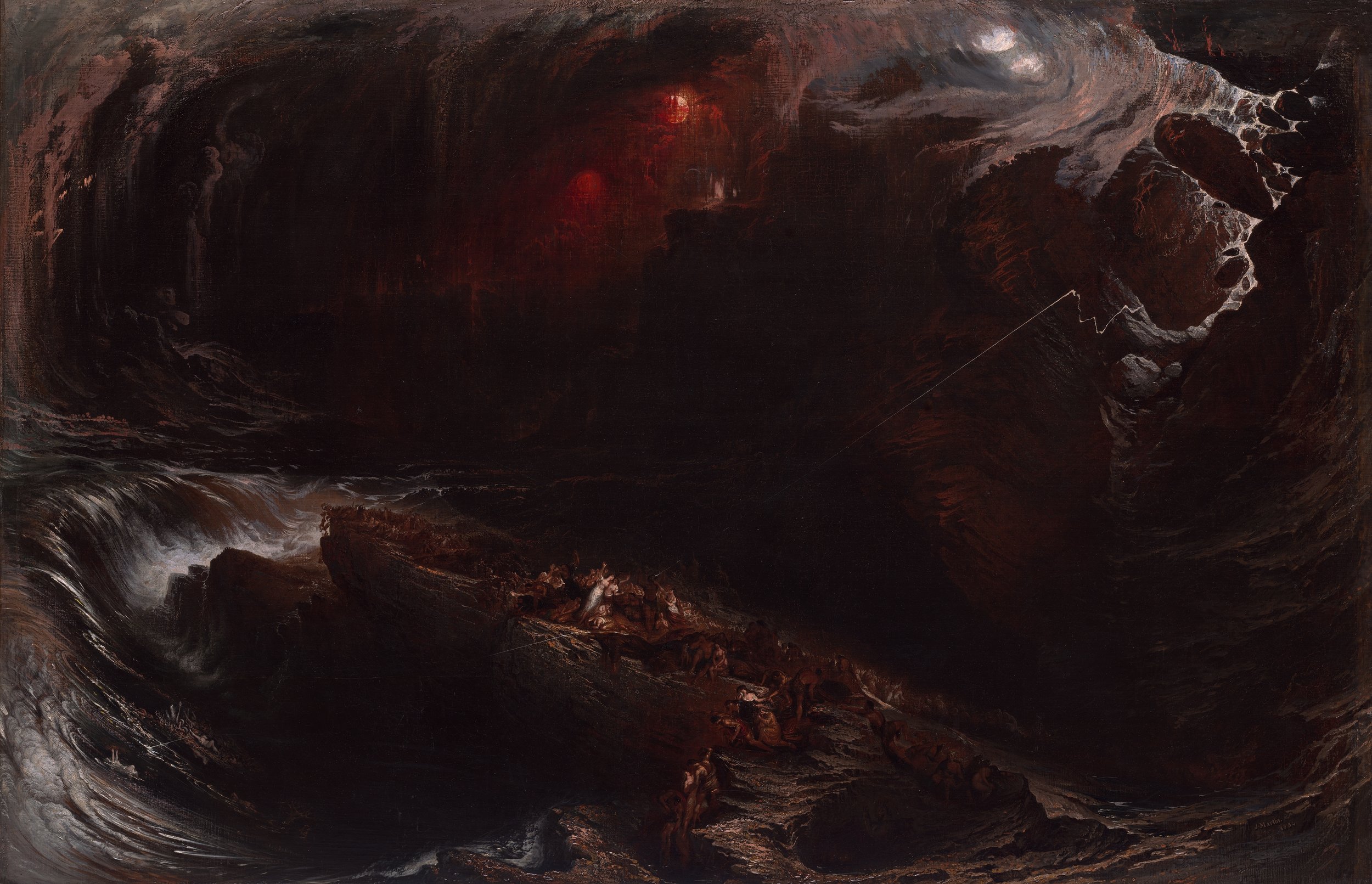Three Hours From Silence

Three Hours From Silence
Estee Zandee
On Spiritual Noise Pollution
Silence is three hours away, I figure. Three hours by car and 45 minutes of hiking.
It’s loud most of the time where I live in a little town in the suburbs of Detroit. We’re situated a block away from a freight-train track that ferries Ford axles across state lines, passing by in squeaky-wheeled cargo cars day and night. We share fences with neighbors and their mowers and snowblowers. Our dog is of the herding variety, compelled to bark the alarm whenever the local squirrel family sets out to forage.
But just shy of 250 miles northwest, there’s the Jordan River Pathway, a 19-mile trail I trek every couple of years. And I know just the spot where the quiet settles in. Beyond the trailhead, down the embankment to the river, over the marsh bridges (watch your footing here), and through old-growth trees, the path opens up to a little valley. The sun beams down on a patch of wild black raspberries, and you can almost hear the heavy golden quiet suspended in the air like honey drooling from a jar. You can almost hear the spaciousness of silence.
The first time I came to this place, I was on a solo hike for my birthday. Another time, I came with my dog, my husband, and my son growing in utero. Every time, I swear my lymphatic system sighs.
It’s not too dramatic to equate silence with biological peace.
We now know that noise pollution contributes, and even causes, an impressive list of health issues: cardiovascular disease, strokes, high levels of the stress hormone cortisol, hearing loss, depression and anxiety, and sleep disruption. Surrounded by such a dissonance, we can’t hear each other, much less hear ourselves think, which results in lower levels of cognition, poorer communication, a lack of productivity, and a weaker sense of well-being.
Economic disparities complicate matters, as they always do. Those who can only afford to live near the cacophony of industrial factories have to deal constantly with the negative effects of noise. Children living near airports or busy highways reflect impairments in memory, attention level, and reading skill. And those are just a few of the effects upon our species.
Noise pollution causes caterpillars’ dorsal vessels (which serve as their heart) to beat faster than usual and causes bluebirds to lay fewer eggs. Dolphins and whales use echolocation for navigation, mating, and feeding, all of which are disrupted by sonar devices that can send pulses as loud as 235 decibels for miles through the blue. (For contrast, the sound of a jet taking off averages 150 decibels.)
We are screaming on this earth, and all of nature hears.
*
Silence has come to me in several beautiful ways. Once, as a 12-year-old out in the Indiana countryside, I trudged up from finishing barn chores in the dark of some December night. My boots crunched through crusted snow and my breath frosted so much I could almost catch it in my mittens. The sense that other, grander things were listening in on us little people caused me to look up. Orion, surprisingly clear, gleamed down at me. And all was hushed as our gazes met.
Another time, another hike, my husband and I took a quick trip to the redwoods. I wanted to see these giants, so old their rings trace 600–1,200 years, even as their branches reach 379 feet tall (taller than the Statue of Liberty). These are the children of Jurassic-era parent trees—but you don’t need an informational placard to tell you. As ancient as they are, these trees are alive and give a palpable sense of presence. They have an intelligence far different than ours, and they’ve survived, grown, and cultivated the forest community around them in ways our brief surface lives work hard to comprehend.
We found a little cove in the trunk of one of these steeples. Soft pine needles under us and ferns gathered around us, we listened to a silence so comfortable we could have nestled in it all day. We had traveled off-season, so there were hardly any other tourists out. Something about the undulating hills, the distance from highways, and the old forest growth worked together to form a sanctuary quiet enough to count the tiny, skittering footsteps of a chipmunk.
Perhaps it’s not too much to say nature testifies to the Great Presence through stillness.
Thomas Merton, in his poem “In Silence,” knew how much the silence of even the stones have to say:
Listen
To the living walls.
Who
Are you? Whose
Silence are you?”
*
“Why you cannot hear me?” my son asks. He’s almost four now, and his pronunciation is quite good, but occasionally even I miss a word or two. Other times, it’s not his pronunciation that creates confusion but the state of my mind. I find myself saying, “I’m sorry, honey, my brain is loud. Can you say that again?”
It seems our brains, like the world, have gotten louder.
Internal noise pollution is a tune all its own. We each play our own specific chord of mental chatter. Mine raps out to-do lists spanning work, household management, and parenting responsibilities. Intrusive thoughts are another sort of unwanted noise, and there’s my personal lean: thoughts of existential dread and disassociation. Worries, both large and minute, if not given due space for processing, beat the same internal gong over and over.
When our brains are loud, life feels louder still. And the cost crops up in the quality of our presence. I not only miss words from my son but also the nuances in conversations, the chance to observe more fully the beauty and the travesties that need to be witnessed. The palpable presence of the redwoods is amplified by their silence, while our internal noise fractures our presence.
There’s an idea preached in Christian circles that we need to quiet ourselves in order to hear God. At a basic level, I acknowledge the sentiment. But I have as good of a chance at limiting God’s ability to speak through my mental chatter as the train behind my house has of overpowering his almighty strength. God can and does speak above the din—both external and internal—and our silence alone does not guarantee us a word or an experience from God.
God has been silencing storms, speaking life over chaos, and startling those who didn’t want to hear since the beginning of humankind. He knows how to speak so that his children can hear.
I cannot limit God. But I am limited.
*
On an impulse, I purchased socially acceptable earplugs to wear in airports and coffee shops. It’s not that I don’t want to talk to people but at times, I need to turn down the volume of the world.
Turns out silence is a billion-dollar business. Noise-canceling technology brought in $13.1 billion in 2021, and people who track such things anticipate this number to triple in seven years. In what I suspect is a mix of desperation and capitalism, sensory deprivation tanks are becoming popular. No less than 11 float spas are situated within an hour’s drive from my home. For three weeks, I couldn’t get the idea out of my head: Nearly zero sensory input for an entire hour? Would that lead to peace and quiet, finally, or panic and isolation?
I found a spa with a discount rate for first-timers. The concierge showed me to a private room and gave me the rundown: Shower first to remove oils and lotions, insert earplugs so the salt water doesn’t sit in your ear canals. Then she showed me the deprivation tank—a white oval futuristic-looking pod that held between 150 to 200 gallons of water. With about 900 pounds of Epsom salts, it was relatively germ-free; but the concierge explained the water is replaced after each use. There was a button to turn on ambient spa music and another for a light that shines purple, green, or blue, based on your choosing. I opted for no light, no sound. Zero sensory input.
The water was 95 degrees—close enough to my body’s temperature that my skin sort of forgot it altogether. The salts created a weightless environment, and I was suspended in a mimicry of the Dead Sea. But I managed to get salt in my eyes three times within as many minutes, and I came up blubbering and grasping for the little spray bottle of plain water set outfor just this purpose. At last, eyes rinsed, I floated.
All was fine until the light in the outer room went out. Then there was absolutely no light. I have a slight phobia of dark basements, and the total blackness triggered this. I panicked and slapped on the pod light for a second. But I wanted darkness, I reminded myself, I wanted stillness. I wanted silence. I tried again, shutting the light off, this time with my hands over my heart. And that simple gesture provided the reassurance I needed to ease into relaxation.
I had been curious if the tank would be a disembodying experience—the stripping away of the sensory, a forgetting of the body—but it was rather embodying. I felt my body. As someone who primarily navigates life as a brain first, heart second, and body last of all, this experience was something of a homecoming. I could sense my back muscles, the nape of my neck, the tightness in my feet, the muscle knot in my right shoulder.
When I had scheduled the float experience, I had hoped I would hear God. I had hoped for mental clarity. But I only found a quieting, a resting—as if to prove the point that no matter how quiet we get, we cannot force or conjure the voice of God.
All noise was reduced to just two soft sounds: the low hum of some engine pump, and my heart. Then the engine quieted, and all I heard was my insistent heartbeat. I didn’t miss the irony that in my search for total silence, I had forgotten that I could not be totally silent. To be utterly quiet, my body was telling me, is to join the chorus of the dead. And I was alive.
Peace didn’t settle over me as much as it unfolded, as if it had been in bud form within all along, but the world had been too loud for me to notice before. I had been too loud.
A prayer formed:
At Your least, You are the silence in my soul
At my most, I am the sound of Your Word in the world.
*
To live is to sound—to contribute to the melody of life. Total silence isn’t realistic for our world or for ourselves. Perhaps more than silence, we need a re-sounding.
There’s a liturgy at the start of every philharmonic performance. Each member of the orchestra takes their seat in their respective section to warm up in a buzz of eclectic sounds. Violists tune a few notes, flutists test their pitch, the harpist runs their fingers up the scale. But all quiets as the conductor steps across the stage to the podium. She taps her baton against the music stand twice and signals the oboist to sound the A—and thus starts the liturgy.
To the sound of the A, each of the 80 or so musicians tune their instruments to match the pitch exactly. It’s only after every instrument is tuned satisfactorily that any melody can be heard.
Madeleine L’Engle, in Walking on Water, writes about how we attune to God’s image more when we speak cosmos over chaos. By that, she means naming what is good, true, and beautiful and giving life to the same. Resounding to the divine note, if you will.
To sound, to give sound, is a part of being alive. And the practice of tuning our lives to a truer note has proven essential to living well. If that reads like a daunting task, it’s because it is. Merton acknowledges as much. About emulating the silent rocks in “In Silence,” he continues:
I will try, like them
To be my own silence;
And this is difficult. The whole
World is secretly on fire.
Resounding is difficult in these places and in these times. But perhaps a first step is practicing the art of tuning our hearts to the good and true and beautiful.
*
One afternoon, I passed my two-week-old son to my mom before she shooed me out for a walk and much-needed sunshine. As soon as my boots hit the trail behind the train tracks (my woods away from the redwoods), I felt a keening so visceral I dry sobbed for a quarter mile. As someone who has long felt misaligned to parenthood, I was more joyful than I ever imagined I could be as a new mom. I was also the most exhausted I’d ever been, and there was something more ethereal happening. I was only just starting to realize that as my body had expanded to accommodate this other life, so my identity too had been expanding. I was more than I was before—and that kind of growth needed a new melody than the one I had hummed in days past. That soundless keening announced a new tuning.
I think less now of how I might find perfect silence—on long hikes, in sensory deprivation tanks, or with noise canceling earplugs—and more about how I might attune to the liturgy of harmony. One of the A notes I’ve found to help me resound is the well-known Prayer of St. Francis. I pray this plumb-line before heading into a tension-filled conversation, a busy day, and any celebration: “Lord, make me an instrument of your peace: where there is hatred, let me sow love; where there is injury, pardon; where there is doubt, faith; where there is despair, hope; where there is darkness, light; where there is sadness, joy.”
We are living instruments and it truly matters what we give voice to. It’s not surprising that we will slip out of tune from time to time, wake up with loud minds, or realize with a start that we’ve been humming along to the wrong songs. But the practice of attuning is our guide back to melodies that are good and true. Because what and how we contribute to the world’s symphony is our ever-present choice to make.
Estee Zandee
Writer & Editor
Estee is a writer & editor at WaterBrook & Multnomah, Christian imprints of Penguin Random House.
Painting by Albert Bierstadt




